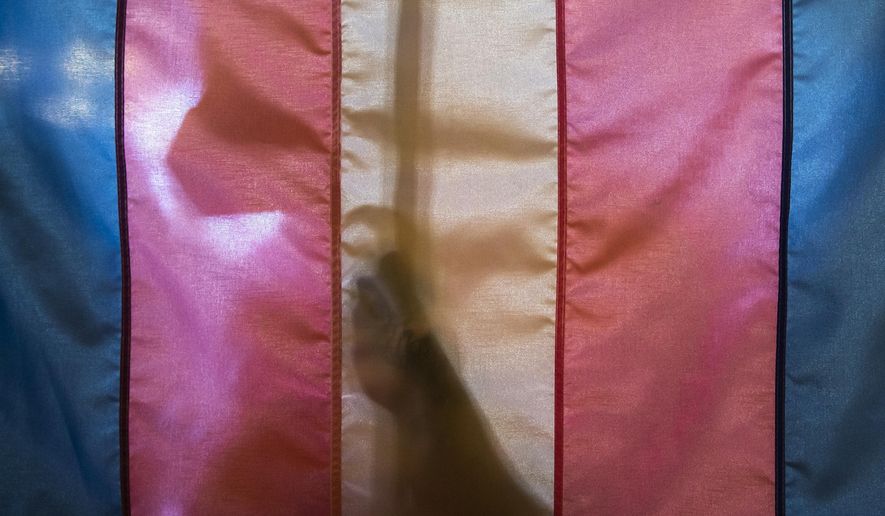Male students who identify as female cannot wear dresses, use the girls’ restroom, adopt female pronouns or play girls’ scholastic sports under a newly implemented policy from the Diocese of Des Moines facing pushback from the left.
The Catholic diocese has come under fire for its Gender Identity Guide and Policy, a six-page standard that went into effect Monday explaining the church’s position on gender dysphoria and listing binding rules for affiliated parishes, schools and organizations.
Under the policy, a person’s biological sex determines his or her pronouns, restrooms, locker rooms, attire and uniforms, as well as participation in scholastic sports, camps and retreats. The rules ban the on-site distribution of medications for gender transition, including puberty blockers.
At the same time, the diocese led by Bishop William M. Joensen stressed that those experiencing gender unhappiness “are unconditionally loved by Jesus Christ and by the church, and that they are vital members of the Body of Christ.”
“Parishes, schools and other Catholic institutions or organizations should be ever mindful, in accord with the policies of this document, to practice charity and to respect the personal dignity of individuals who may express tension or concerns about their biological sex,” said the document.
Those blasting the rules included the LGBTQ group One Iowa and the Interfaith Alliance of Iowa, which accused the diocese of “promoting a harmful narrative through dangerous policies targeting its staff and students who are transgender.”
SEE ALSO: Puberty blockers, preferred pronouns, cross-dressing banned by Diocese of Des Moines
Democratic state Sen. Claire Celsi said the diocese is “trying to shun and exclude people based on their sexual orientation and gender expression.”
She referred to Iowa Gov. Kim Reynolds’ landmark school-choice proposal that would let a student’s per-pupil allotment be used for private schools.
“These schools want public dollars and want to treat kids in a way that might cause them to commit suicide. This is not what Jesus would do,” said Ms. Celsi in a Jan. 4 post on Facebook.
Praising the diocese was Christian conservative author Rod Dreher, who called it “breathtaking to think that common-sense rules like this are considered unusual and brave these days, but that’s where we are.”
“Good for Bishop Joensen,” Mr. Dreher said in a Tuesday column for the American Conservative. “What happens if the state decides to pull public funding? We’ll see. But let’s be grateful for this move. What about your diocese, or whatever the ecclesiastical governing division of your church is? Bishop Joensen should not stand alone.”
The policy noted that some parishioners “may disagree with these practices, and we acknowledge their freedom of conscience to withdraw or absent themselves from situations they find objectionable.”
“Concomitantly, they must likewise respect the church’s mission to witness to truths accessible to reason and faith if they are to fully participate in our faith communities, including our Catholic schools,” the policy said.
New guidelines on the care of those with gender dysphoria from the diocese of Des Moines.
“Any response that merely ratifies and reinforces the perceived disconnect between biological sex and gender- affiliation is not genuine compassion.”https://t.co/fv3BPneDsz</ p>— Caroline Farrow (@CF_Farrow) January 17, 2023
The document also stressed that those who express “a tension between their biological sex and their ’gender’” should be directed to ministers and counselors “who will assist the person in a matter that is in accord with the directives and teachings of the church.”
The rules adopted Friday came after parish and school leaders asked Mr. Joensen “to provide guidance on how they should welcome and minister to those coping with gender dysphoria while following Catholic Church teaching,” said diocese spokeswoman Anne Marie Cox.
“He composed a task force for this purpose, and after two years of study, prayer, listening and consultation, a policy was developed that begins with love,” she said in an email. “As a diocesan community, we are committed to upholding Catholic social teaching that enjoins respect for the life and dignity of every person as created in the image of God.”
• Valerie Richardson can be reached at vrichardson@washingtontimes.com.




Please read our comment policy before commenting.